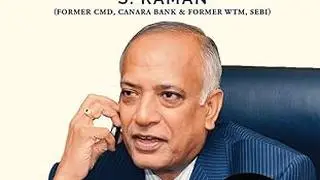Public infrastructure creation has traditionally been a government preserve. Gajendra Haldea, a maverick civil servant, laid the ground for a major disruption. In India, Public Private Partnership (PPP) in the infrastructure sector would have been stillborn without Haldea.
The Difficulty of being Gajendra Haldea is a collection of essays penned by stalwarts from industry, politics, academia, journalism, and civil service. Contributors have paid rich tributes to ‘Gajsaab’, drawing upon their personal association with him.
The book is a portrayal of the profound contribution of a formidable bureaucrat, who earned the sobriquet of ‘infrastructure czar’ of India. His most enduring legacy is a set of policy and regulatory documents —Model Concession Agreements (MCA), which became the bedrock for leveraging private investments into infrastructure.
Haldea relied on transparent dialogue with industry, with a goal to ensure fair risk apportionment between public and private entities. His formula was simple and elegant — define outcomes and adopt a single evaluation parameter.
Haldea inspired confidence amongst private investors — the documents had elaborate rules of the game, leaving no room for ambiguity. MCA was adopted across sectors — national highways, ports, power transmission lines, and metro projects.
In doing so, Haldea navigated through ‘multiple layers of interests and conflict of interests’. Later, the same principles were invoked for drawing foreign investments in railway locomotive manufacturing, hitherto a fully regulated sector.
Haldea unflinchingly raised the red flag when so warranted. The first tranche of fast-track power purchase agreements negotiated with multinational power companies was heavily skewed in their favour. State governments stood guarantee for payment defaults by cash-strapped electricity boards, and the Central government was to provide a counter-guarantee.
This is where Haldea entered the picture and became the ‘architect of the counter-guarantee framework’.
Dabhol power project was in the eye of the storm and Enron, backed by a battery of foreign lawyers, pulled all stops. Ashok Lavasa, recalls that even Soli Sorabjee applauded Haldea’s legalese which saved the day, as it had capped the amount payable by the Government of India.
NK Singh commends his role in crafting the Electricity Act of 2003, which replaced a century-old legislation. The Act paved the way for unbundling the electricity sector and enabling open access for consumers. He describes it as a ‘mindset change in the liberalisation process’.
The best assessment of a boss is given by his teammates. Lavasa is generous in his praise.
“It was difficult to break the intellectual spell that Haldea cast on people who came in contact with him.” He was a “reformer, the crusader for public causes.” Like a “smart wrestler”, he could “disentangle himself from a hold that produced no points” but return “with another effective gambit.”
Bosses, on the other hand, are more tight-fisted in dishing out praise. Yet, NK Singh, who was Haldea’s boss, has been extravagant in praise — describing him as “an officer a class apart”, who had a “sense of sophistication in the etiquette of diplomatic culture.”
Najeeb Jung, his friend, and batchmate, describes him as an ‘aficionado of culture, beauty, food, and music.” He was also “a man of principles and integrity, unafraid and ever ready to take on the world”.
Hemant Sahai, a leading lawyer, commends his “ability to think laterally and design solutions.” Yet he “had some quirks and idiosyncrasies” with “certain rigidities”, bordering on “stubbornness.”
He “reveled” in being known as a “spoiler”, who created roadblocks to projects. Yet, even his detractors “grudgingly acknowledged the immense intellectual sophistication” of his models.
Sahai calls him “a rare bird” with “the wisdom of an owl, the vision of an eagle, the tenacity of a vulture, the speed and strength of a Hayabusa, the endurance of a flamingo, the beauty of a hummingbird and, almost paradoxically, the calmness of a dove.”
The book is not just an assemblage of encomiums and reminiscences. It is also a rich repository of information about a critical phase in the journey of infrastructure development in India.
For the uninitiated, it provides a glimpse into the complexities and intricacies of policy-making, especially in unchartered territories. The book can also serve as a toolkit for civil servants actively engaged in infrastructure policy, as the first principles remain the same.
New entrants into the bureaucratic fraternity would find remarkable illustrations from the life of a distinguished forebear — Haldea’s civil service commandments. Yet, few would have the courage or fortitude to follow in his footsteps — to be fearless in expression, regardless of the stakes involved.
Perhaps this is the reason, the editor has aptly chosen the title “The Difficulty of being Gajendra Haldea.”
Haldea would be smiling from heavens above, a trifle amused and a little bemused. The generosity of praise would leave him befuddled and the critique would bring some glee. Meanwhile, his huge body of work continues to inspire and guide how roads are built, or airports established in this country.
(The reviewer is an IAS officer. Views expressed are personal)
Check out the book on Amazon.










Comments
Comments have to be in English, and in full sentences. They cannot be abusive or personal. Please abide by our community guidelines for posting your comments.
We have migrated to a new commenting platform. If you are already a registered user of TheHindu Businessline and logged in, you may continue to engage with our articles. If you do not have an account please register and login to post comments. Users can access their older comments by logging into their accounts on Vuukle.